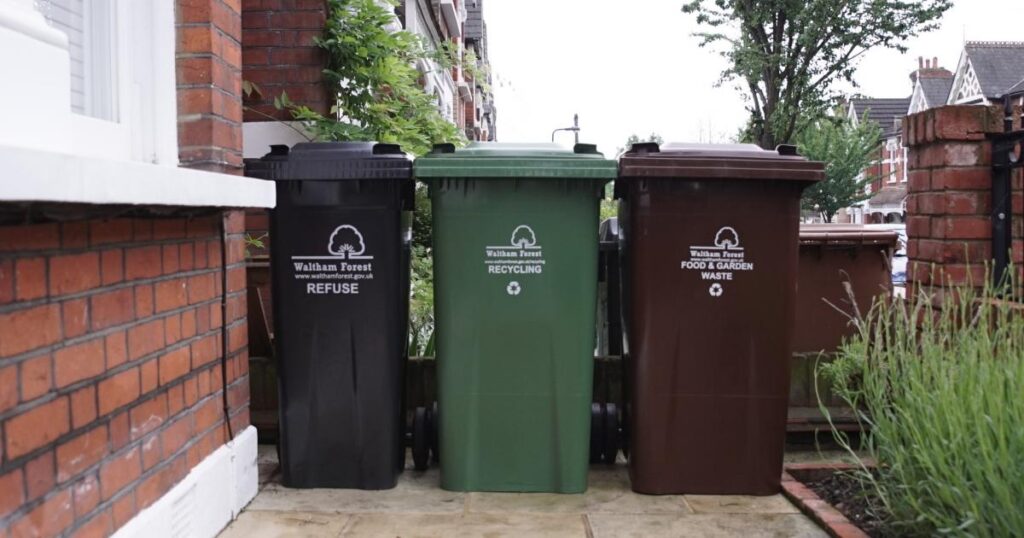The town hall agreed in October 2023 to stop weekly collections of black waste bins for non-flat residents, but is only now introducing the new schedule.
The council says the move will improve recycling in the borough, as 85 per cent of what goes into black bins could be recycled, and the new policy is in line with the majority of other London authorities.
However, residents have said uncollected bins could “go bad” in the summer and leave a “heady aroma” around their homes.
Waste collection in the borough is divided across four bins.
They include a black bin for non-recyclable rubbish, a large green bin for recyclable items, and a brown bin for garden waste.
MORE NEWS: Couple were run down in Spain by drunk driver, court hears
Last year, the council introduced a dedicated ‘caddy’ for food waste, in line with fresh regulations.
Under the new scheme, residents who live in terraced, semi-detached or detached homes will have their black bins collected fortnightly rather than weekly.
Collections will remain weekly for residents living in blocks of flats, while green recycling bins and food waste caddies will continue to be collected weekly for everyone.
Brown garden waste bins will also still be collected fortnightly.
One resident wrote on Facebook: “What an absolutely dumb idea. This will result in more vermin, foul smells and flies/maggots around homes, especially in the summer months.
“Definitely will see an increase in fly-tipping and the foxes will be having a field day.”
Another wrote: “More council tax, reduced services.”
A spokesperson for the Forest Residents Association told the Local Democracy Reporting Service: “It’s in the summer particularly when it will become more of a problem.
“You will see that if something doesn’t get collected, or if people have just ran out of space, then within a few hours there’ll be foxes and rats. They’ll feast on it and then [the rubbish] is all over the street.
“Residents will get used to [the changes] but you could have more and more people not bothering and dumping their bin bags wherever.”
Deputy council leader Clyde Loakes, who oversees the council’s environmental policies, said: “The change builds on the success of our food waste collection rollout last year – we are now collecting over 100 tonnes of food waste each week that would previously have gone into black bins.
“Overall, we shall be collecting more bins when this change comes in over a resident’s two-week bin cycle than we were this time last year.”
He said the changes were “part of our ambition to improve recycling rates in Waltham Forest and become a net-zero borough by 2030”.
The deputy leader said around “85pc” of Waltham Forest households’ waste can now be recycled in either their green bin or via a food waste caddy, both of which are collected weekly, alongside their brown garden waste bin, which is collected fortnightly.
Data indicates that the vast majority of councils across the UK collect rubbish on a fortnightly or tri-weekly basis.
The latest figures show that 259 out of 295 councils operate on at least a fortnightly schedule.
Cllr Loakes added that those figures include councils with the highest recycling rates in the country.
Conservative group leader and Endlebury ward councillor Emma Best said: “While the Conservatives would have maintained weekly collections, at this point, our call to the Labour administration is to at least make allowance in their budget to support this change and avoid the dirt, mess and pest infestation that will inevitably occur if they don’t.”
The council’s budget for 2025/26 does not include provisions to handle any extra fly-tipping.
However, Debbie Porter, the council’s environment director, said at a scrutiny meeting last week that the council “did not expect” littering to worsen but was prepared.
She said the council had launched a campaign to remind residents how to report fly-tippers and the immediate £500 fine it carries. Officers have also been patrolling at night to try catch fly-tippers in action.
She added: “It isn’t something we’re taking lightly and we want to take all measures to keep the borough as clean as we all want it to be.”
The changes will come into effect for some households on Monday, March 24 and others on Monday March 31.




